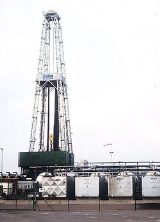
Oil exploration
Overview
Petroleum geologist
A petroleum geologist is an occupation that involves all aspects of oil discovery and production in the field of petroleum geology. Petroleum geologists are usually linked to the actual discovery of oil and the identification of possible oil deposits or leads. It can be a very labor intensive task...
s and geophysicists for hydrocarbon
Hydrocarbon
In organic chemistry, a hydrocarbon is an organic compound consisting entirely of hydrogen and carbon. Hydrocarbons from which one hydrogen atom has been removed are functional groups, called hydrocarbyls....
deposits beneath the Earth's surface, such as oil
Petroleum
Petroleum or crude oil is a naturally occurring, flammable liquid consisting of a complex mixture of hydrocarbons of various molecular weights and other liquid organic compounds, that are found in geologic formations beneath the Earth's surface. Petroleum is recovered mostly through oil drilling...
and natural gas
Natural gas
Natural gas is a naturally occurring gas mixture consisting primarily of methane, typically with 0–20% higher hydrocarbons . It is found associated with other hydrocarbon fuel, in coal beds, as methane clathrates, and is an important fuel source and a major feedstock for fertilizers.Most natural...
. Oil and gas exploration are grouped under the science of petroleum geology
Petroleum geology
Petroleum geology refers to the specific set of geological disciplines that are applied to the search for hydrocarbons .-Sedimentary basin analysis:...
.
Visible surface features such as oil seeps, natural gas seeps, pockmarks (underwater craters caused by escaping gas) provide basic evidence of hydrocarbon generation (be it shallow or deep in the Earth).
Unanswered Questions

